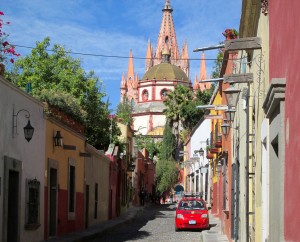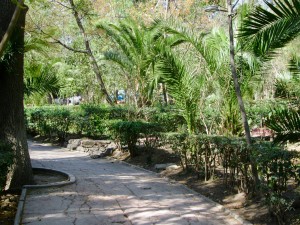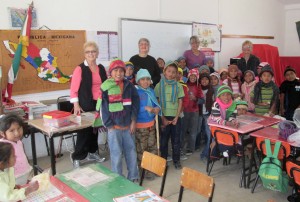Mexico is not my mother country, but I’m beginning to think of it as motherly. Motherly in the best sense: warm, patient, tolerant, forgiving, and accepting – even toward adoptees, like me.
When friends in the States ask how and why I’m liking my new life in Mexico, I sometimes recite my ABC’s: Affordability (the cost of living in Mexico is markedly lower than in the U.S., so a single, self-supporting retired woman like me can afford to live a healthier, less stressed-over-finances life), Beauty (here in San Miguel de Allende I’m awash in beauty [see photos as proof]), and Climate. As I draft this post, in longhand, on a lined pad, I am stretched out on a chaise lounge, sunbathing on my rooftop terrace in late February under a clear, vibrant, Taos-blue sky and swathed in nearly-80-degree temperatures. Bliss.
But when I dig deeper into my reasons, it’s the “motherly” aspect that I find at the core. I feel embraced by an old, wise, feminine spirit here, and I’m basking in that nurturance.
I know I’m a newbie, but I think I’m also fairly clear-sighted. All countries, like the human beings that inhabit and run them, are flawed; and Mexico, as anyone who reads newspapers knows, is no exception. I’m not so naïve as to think Mexico is perfect – or even superior to anywhere else in all ways. I’m just saying it suits me, and I’m grateful for Mexico’s motherly embrace.

This past week a friend and I saw a film at the Biblioteca in San Miguel’s el Centro – Michael Moore’s just-released film, “Where to Invade Next.” In it, Moore, dramatically wrapped in an American flag, marches into a number of mostly European countries to see what good ideas he might capture and bring back to the States. He sees, for instance, healthy, gourmet, four-course meals (complete with Camembert) served at an inner-city grammar school in France; free tuition at universities in Slovenia (which some American students are attending in order to avoid college debt); five-month paid maternity leave in Italy (so new parents can bond with their newborns); a breathtakingly humane prison system in Norway (where hard-core criminals learn decency); and the power of the women’s movement in Tunisia.
This is a brilliant film – funny, timely, hopeful, and wise – in my view, Moore’s best film to date. I’m urging everyone I know and love to see it asap. But I couldn’t help but wish that Michael Moore had traveled to Mexico as well. If he had, perhaps he could have shed light for American filmgoers on the way older people are respected and cared for here – if not directly through government programs, then by each other.
One senior citizen program I know about provides half-price discounts on many significant items, including transportation. I’ll be able to apply for this senior discount card in a few months.

Some refer to Mexico as a “developing country” (an imperious term that always rankles me; it’s like someone calling me a “developing woman” because I have small breasts. Who is doing the measuring and judging – and why?). But in all its development and modernity Mexico hasn’t, it seems to me, altogether abandoned its ancient traditions, including respect for elders. Every time I take a bus, for example, I observe a young person relinquishing his or her seat for an old person, without, it appears, a second thought.
I’ve only lived in San Miguel de Allende three months so far, but already I’ve met a number of older, single gringas like myself who feel the way I do. Without prompting, they happily say, “Yes, I live here now, and I plan to die here.”
This remark brings to mind U.S. inaugural poet Richard Blanco’s poem, “Mother Country,” about his mother’s emigration from Cuba in 1968, when she was seven months pregnant with him. The last lines of the poem are his mother’s words to him after a lifetime in the United States:
“You know, mijo, it isn’t where you’re born that matters, it’s where you choose to die – that’s your country.”
Which makes me wonder now: Do we choose our mother country? Or does it choose us?

